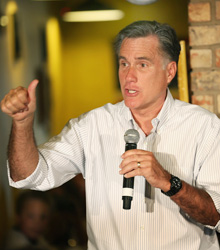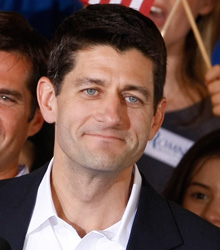 |
 |
|
Mitt Romney (XINHUA) |
Paul Ryan (XINHUA) |
Mitt Romney often breaks out anti-China rhetoric in his stump speeches as a presidential candidate, tapping into blue-collar resentment over outsourced jobs and unease over China's rising prominence. As president, he promised to declare China an "illegal currency manipulator." In a 2011 op-ed in The Washington Post, Romney accused China of systematically exploiting other economies by enabling piracy and subsidizing domestic producers.
Romney has also threatened to invoke trade tariffs against China and "end procurement of Chinese goods and services" if China fails to follow WTO protocols, but economists say Romney's commitment to free trade makes sanctions unlikely.
The hardline stance against China is popular with voters, who fear a shift toward "socialism" in Obama's policies and are concerned that China is the largest holder of U.S. debt. On his campaign website, Romney advocates an expansion of U.S. naval presence in the Western Pacific and deepening ties with India and Indonesia to guarantee trade routes and U.S. interests.
"Our objective is not to build an anti-China coalition. Rather it is to strengthen cooperation among countries with which we share a concern about China's growing power and increasing assertiveness and with whom we also share an interest in maintaining freedom of navigation and ensuring that disputes over resources are resolved by peaceful means. It is yet another way of closing off China's option of expanding its influence through coercion," Romney states on his website.
Romney has also promised to press China on human rights, saying a failure to support dissidents out of fear of offending the Chinese Government would "embolden" China's leaders. He accused Secretary of State Hillary Clinton of relegating the "future of freedom to second or third place" when she stated in 2009 that the Obama administration would not let U.S. concerns over China's human rights record interfere with cooperation on global economic concerns.
In an August 16 speech, Paul Ryan, Republican vice presidential candidate, accused Obama of allowing China to treat him like a "doormat" over trade issues. He promised that he would "crack down on China cheating" and to protect U.S. trade interests.
It's a seemingly about-face for Ryan, who voted against the Currency Reform Fair Trade Act in 2010 that would have given Obama more authority to impose tariffs on imports from countries that have "fundamentally undervalued" currencies.
Ryan has also taken the lead in criticizing China's social policies, saying in a speech to the Alexander Hamilton Society that it is clear China has "different values" and that "a liberalizing China is not only in the interests of the world, but also in China's own best interests as it copes with the tremendous challenges it faces over the next couple of decades."
| 